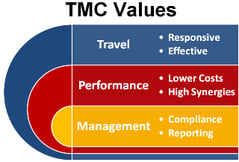There are several audiences for this question and at least as many possible answers. The audience which likely first comes to mind is the business person - finding his seat on an early Monday morning, then monitoring connection times as he makes his way home on  Friday. Invisible in that mental picture is a second audience: the traveler’s corporate travel policy. Then there is a third one – the corporate managers responsible for the execution and outcomes of that policy. It’s impossible for any travel agency to arrive at a good answer to the question unless it thinks in terms of managing travel rather than simply arranging travel.
Friday. Invisible in that mental picture is a second audience: the traveler’s corporate travel policy. Then there is a third one – the corporate managers responsible for the execution and outcomes of that policy. It’s impossible for any travel agency to arrive at a good answer to the question unless it thinks in terms of managing travel rather than simply arranging travel.
Over the past ten years a widening dichotomy has developed between business and leisure travel. Leisure travel has been highly influenced by online aggregators which provide recreational travelers the means by which to compare options and prices for all the elements of a trip. Because the profile of corporate travel – shorter time horizons; dependencies on other travelers; more sensitive to use of a business day – is different from leisure travel, the revolution in online travel has had less impact. A 2015 Travizon survey of business travelers revealed 84% of employers used the services of a travel management company (TMC).
Three Areas of Client Value
A TMC has the resources to provide the customer support required by the business travel profile and typically focuses on delivering client value in three areas:
Travel logistics: the ability to make responsive travel arrangements on two levels: one is a highly intuitive user interface which leverages innovative technology to enable quick online execution of travel plans along with subsequent changes; the second is travel industry software that supports a broad range of travel resources, service offerings and pricing options for effective travel choices.

Performance: the travel company will be judged on its ability to quickly lower costs for contracted services, particularly by taking advantages of economies of scale – both those brought to the table by the TMC itself and also account-specific ones created by the travel company from the client’s travel patterns and buying behaviors.
Management: travel technology will also be expected to support client management of real-time travel policy compliance (e.g. challenging a submitted reservation that violates the policy, and/or requiring specific approvals prior to booking) and management of travel expenses and savings through real-time dashboard reporting of key performance indicators.
The Business Traveler Challenge
A challenge to helping your corporate traveler is the potential for conflict between his travel agenda and that of his company. For the most part, a company traveler is interested in wide travel choices, quick and intuitive booking procedures, easy itinerary changes and technology to help with expense reimbursements. To be sure, the company also wants employees to book travel easily and efficiently, but that desire is balanced against a need to avoid unnecessary travel, control necessary travel costs and maintain an overall travel policy for those purposes.
The travel management company may be accountable to company management, but the impact of highly dissatisfied corporate travelers on that relationship cannot be underestimated. Fair or not, the travel company is often the scapegoat for unpopular travel policies or governance procedures originating from within the company.
This challenge brings us to the first of six steps which the travel management company can take to help travelers achieve the professional objectives of their corporate travel and have a good personal experience at the same time.
Six Ways to Help the Business Traveler
1. Be Proactive with the Travel Policy: in the majority of instances, a travel company’s new corporate account will come with an existing corporate travel policy rather than embarking on a new one. Regardless, the corporate client should expect the new company to take measure of their policy and bring experience to bear. Discovery of past issues should lead to lessons both learned and applied. Future issues, on the other hand, can often be anticipated by knowing the level of collaboration that went into the policy formulation.
For example, many corporate policies originate within a company’s procurement department. Procurement is well versed in contractual actions but can be less so for operational areas. Unless the policy was formulated by procurement with good communication between all affected parties (travelers, sales/department managers, finance/accounting, etc.) buy-in will be difficult to achieve; without buy-in, effective compliance is at risk. If past issues, or the prospect of future issues, are troubling - the travel company should encourage the company to work with it on mitigation tactics.
2. Consolidate and Communicate: consolidating corporate spend to designated suppliers of such travel services as airlines, hotels and rental cars is a necessary tactic to achieve cost savings. At the same time, there should be a communications strategy to explain the nature and rational of the consolidation. Business travelers all have their favorite suppliers but can appreciate the need for consolidation tactics; explaining what and why will make acceptance and compliance easier to achieve.
3. Leverage Technology: the travel company should have a well thought out travel technology strategy that delivers innovation in such functional areas as: simplified booking; real time information on bookings & status; policy compliance; service level monitoring; issuance of travel and weather alerts.
In particular technology should provide data supporting insight and action based on customer travel behaviors – actions such as exception-based policy re-configurations. For example, restricting choice to lowest airfares would maximize cost control. As a practical matter, certain employee roles could easily make such strict compliance a mistake – being late for a key client presentation but saving $50 as an example.
Having the technology to recognize behavior patterns, then using the data to make sensible compliance adjustments, will enable the right people to take sensible actions – without rewarding others who might simply be in a bind due to poor planning.
4. Mobility: a highly functional travel app, customized for the corporate client, will play an important part in the overall travel company's value proposition. Per the 2015 Travizon survey, the most useful features of corporate travel apps were real-time flight information (84%) and instant itinerary access & sharing (19%). Given the growing acceptance of apps, it is certain user expectations for additional capabilities, particularly around key activities as online booking and itinerary changes, will increase.
5. Dedicated Personnel: whenever possible and practical, the travel management company should assign specific agents to handle the support of client business units or departments. Immediately, all travelers in those areas will benefit from, and perceive value in, knowing they have a highly individualized escalation point for critical travel issues. Over time, those agents will learn the nuances of their area’s travel requirements and become a valuable source of knowledge and relationship management.
6. Reporting: the travel management company’s technology must support intuitive and insightful reporting on client travel expenditures and behavior. This reporting should be of two types: one - real-time dashboards providing instant status on service level performance (SLA), key performance indicators and issue escalation; two - standard, scheduled, reports that summarize SLA outcomes for contractual purposes and enable TMC/Client management to clearly see how policy outcomes are progressing and base any changes or decisions on accurate and easily understood information.
Examples of data points that would fall into this reporting scope include: unassisted online booking activity; non-compliance costs by type of travel service; unused tickets; trip miles & cost per mile by business unit/department; total savings attributed to compliance; justified (by role exception) lost savings; unjustified lost savings.
As with so many other areas of travel industry operations, these six steps emphasize the value of sound technology investments and good communications strategies. Even perfect execution of these steps may result in some travelers encountering headaches and misfortune, but in those regrettable instances, the TMC will find itself addressing exceptions rather than chronic conditions.
















